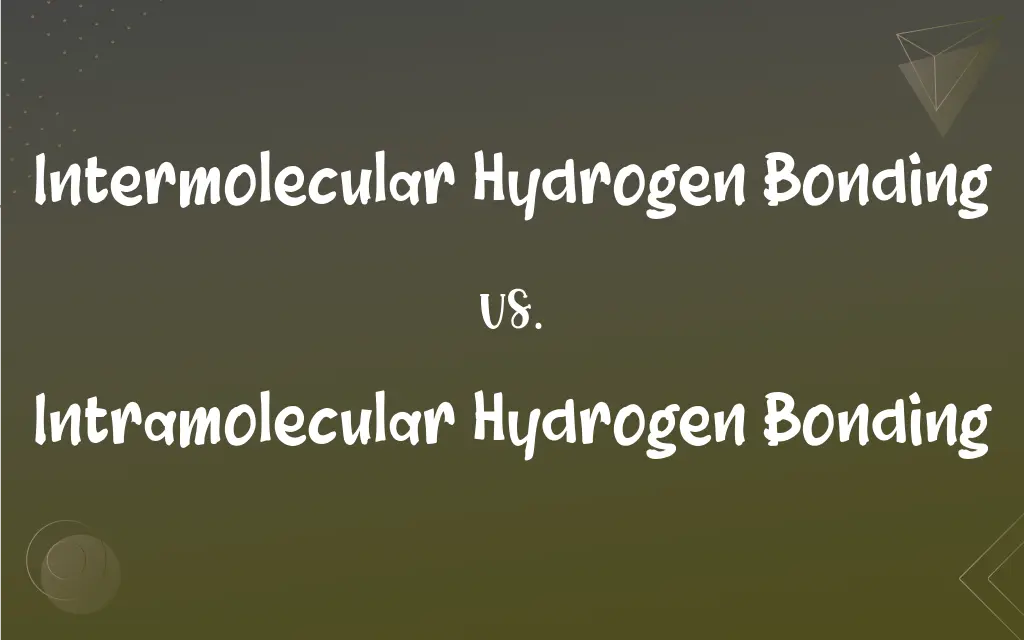Intermolecular Hydrogen Bonding vs. Intramolecular Hydrogen Bonding: What's the Difference?
Edited by Aimie Carlson || By Janet White || Published on March 3, 2024
Intermolecular hydrogen bonding occurs between molecules, influencing boiling points and solubility, while intramolecular hydrogen bonding happens within a single molecule, affecting its shape and reactivity.

Key Differences
Intermolecular hydrogen bonding is a type of weak chemical bond that occurs between hydrogen atoms in one molecule and electronegative atoms (such as oxygen, nitrogen, or fluorine) in a neighboring molecule. This bonding is crucial for the physical properties of many substances, including water, where it leads to high boiling points, surface tension, and the unique properties of ice. In contrast, intramolecular hydrogen bonding occurs within a single molecule when a hydrogen atom bonds to an electronegative atom (like oxygen or nitrogen) that is part of another functional group within the same molecule.
The presence of intermolecular hydrogen bonding often leads to higher melting and boiling points because a significant amount of energy is required to break these bonds. Intramolecular hydrogen bonding, on the other hand, can lead to the stabilization of certain conformations of a molecule, which may decrease its reactivity. This is because the molecule adopts a shape that minimizes repulsion between different parts of the molecule, often leading to cyclic structures that are less likely to participate in further chemical reactions.
Both intermolecular and intramolecular hydrogen bonding play vital roles in the biological world. Intermolecular hydrogen bonding is key to the formation of the double helix structure of DNA, where it stabilizes the pairing of nucleotides between two strands. Intramolecular hydrogen bonding, however, can influence the folding and stability of single-stranded nucleic acids and proteins, affecting their function and interaction with other biomolecules. The delicate balance between these types of hydrogen bonding is crucial for the myriad of biochemical processes that sustain life.
Comparison Chart
Location of Bonding
Between different molecules.
Within the same molecule.
Effect on Physical Properties
Increases boiling and melting points.
Affects molecule shape and reactivity.
ADVERTISEMENT
Role in Water
Responsible for high boiling point and solubility.
Not applicable.
Impact on Molecular Structure
Influences the structure of molecular assemblies.
Causes rigidity and affects conformations within molecules.
Biological Significance
Crucial for the structure of DNA and protein folding.
Influences the folding of biomolecules and their internal stability.
Intermolecular Hydrogen Bonding and Intramolecular Hydrogen Bonding Definitions
Intermolecular Hydrogen Bonding
Influences the melting and boiling points of substances.
Hydrogen bonding between ammonia molecules elevates its boiling point.
Intramolecular Hydrogen Bonding
Stabilizes specific molecular conformations.
Intramolecular hydrogen bonding in cyclic compounds restricts rotational freedom.
ADVERTISEMENT
Intermolecular Hydrogen Bonding
Key to the formation of complex biological structures.
Intermolecular hydrogen bonding stabilizes the secondary structure of proteins.
Intramolecular Hydrogen Bonding
Influences the spectroscopic characteristics of compounds.
Intramolecular hydrogen bonding can be observed in the IR spectrum of certain organic molecules.
Intermolecular Hydrogen Bonding
Bonds between hydrogen in one molecule and an electronegative atom in another.
Water's high boiling point is due to intermolecular hydrogen bonding between water molecules.
Intramolecular Hydrogen Bonding
Affects molecular reactivity and properties.
Intramolecular hydrogen bonding in flavonoids affects their antioxidant activity.
Intermolecular Hydrogen Bonding
Determines the physical state and solubility of compounds.
Intermolecular hydrogen bonding makes alcohol soluble in water.
Intramolecular Hydrogen Bonding
Bonding within a molecule between hydrogen and an electronegative atom.
Intramolecular hydrogen bonding in ortho-nitrophenol causes it to have a lower boiling point than its para isomer.
Intermolecular Hydrogen Bonding
Essential for the structure and properties of liquids.
The surface tension of water is a result of intermolecular hydrogen bonding.
Intramolecular Hydrogen Bonding
Leads to the formation of cyclic structures within molecules.
Salicylaldehyde exhibits intramolecular hydrogen bonding, forming a six-membered ring structure.
FAQs
What is intermolecular hydrogen bonding?
Bonding between hydrogen atoms of one molecule and electronegative atoms of another.
What is intramolecular hydrogen bonding?
Hydrogen bonding within the same molecule.
Why are melting and boiling points higher in substances with intermolecular hydrogen bonding?
Because breaking these bonds requires additional energy.
How does intramolecular hydrogen bonding influence protein folding?
It can stabilize specific conformations within the protein's structure.
Does intramolecular hydrogen bonding affect molecular rotation?
Yes, it can restrict rotational freedom, stabilizing the molecule.
What types of molecules exhibit intermolecular hydrogen bonding?
Molecules with hydrogen attached to electronegative atoms like oxygen or nitrogen.
How does intermolecular hydrogen bonding affect water?
It contributes to water's unique properties like high boiling point and surface tension.
Can intramolecular hydrogen bonding change a molecule's shape?
Yes, it can stabilize certain conformations, affecting the molecule's shape and reactivity.
How does intermolecular hydrogen bonding affect viscosity?
It can increase the viscosity of liquids by linking molecules together.
Does intramolecular hydrogen bonding affect a molecule's boiling point?
It can lower boiling points by reducing the need for intermolecular interactions.
What role does intermolecular hydrogen bonding play in DNA?
It stabilizes the double helix structure by bonding between complementary bases.
Are all organic compounds capable of intramolecular hydrogen bonding?
No, only those with the correct arrangement of donor and acceptor within the same molecule.
How does temperature affect intermolecular hydrogen bonding?
Increasing temperature can weaken these bonds, leading to phase changes.
What impact does intermolecular hydrogen bonding have on evaporation?
It slows evaporation by increasing the energy required to separate molecules.
Why is intermolecular hydrogen bonding important in medicinal chemistry?
It influences drug solubility, bioavailability, and the formation of drug-receptor complexes.
How is intramolecular hydrogen bonding used in synthetic chemistry?
To design molecules with desired shapes and properties, influencing their synthesis and activity.
Can intermolecular hydrogen bonding influence solubility?
Yes, it can enhance the solubility of polar molecules in water.
Is intramolecular hydrogen bonding common in small molecules?
Yes, especially in molecules with functional groups positioned to allow internal bonding.
Can intramolecular hydrogen bonding be observed in all solvents?
Its effects are intrinsic to the molecule and not dependent on the solvent, though solvent can influence the molecule's conformation.
How does intramolecular hydrogen bonding affect chemical reactivity?
It can decrease reactivity by stabilizing the molecule against reactants.
About Author
Written by
Janet WhiteJanet White has been an esteemed writer and blogger for Difference Wiki. Holding a Master's degree in Science and Medical Journalism from the prestigious Boston University, she has consistently demonstrated her expertise and passion for her field. When she's not immersed in her work, Janet relishes her time exercising, delving into a good book, and cherishing moments with friends and family.
Edited by
Aimie CarlsonAimie Carlson, holding a master's degree in English literature, is a fervent English language enthusiast. She lends her writing talents to Difference Wiki, a prominent website that specializes in comparisons, offering readers insightful analyses that both captivate and inform.
































































